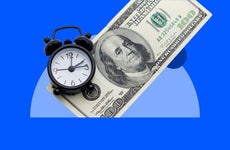Buy now, pay later statistics

The Bankrate promise
At Bankrate we strive to help you make smarter financial decisions. While we adhere to strict , this post may contain references to products from our partners. Here's an explanation for .
Buy now, pay later (BNPL) services offer short-term installment loans that allow consumers to finance their purchases over a set period of time, interest-free. Because of this flexibility, BNPL platforms have become quite popular — particularly among online shoppers — over the last couple of years.
But despite BNPL’s increasing popularity, these short-term loans can lead to financial distress, if not used responsibly. According to a recent report by the CFPB, BNPL borrowers are more likely to be highly indebted or carry a balance or have delinquencies on their credit card accounts compared to non-BNPL users.
- Buy Now, Pay Later (BNPL)
- a short-term financing method that allows you to make purchases and pay for them in interest-free installments. BNPL is also known as a point of sale installment loan.
Buy now pay later statistics
- On average, 17% of consumers with a credit record used a BNPL platform to finance at least one purchase in 2021.
- The average amount financed among BNPL borrowers within a year is $1,000.
- Those with higher incomes are less likely to use BNPL platforms. Only 9% of those with annual incomes over $200K used BNPLs at least once.
- BNPL use is more frequent among renters than homeowners, with 22% of BNPL users identifying as renters and 15% as homeowners.
- Women are more likely to use BPNL platforms (20%) than men (14%).
Buy now, pay later apps
According to a study by C+R Research, there are about a dozen BNPL platforms in the United States alone. The table below shows the most popular platforms among consumers.
| Platform | Percentage of consumers who use it |
|---|---|
| PayPal Credit | 57% |
| Afterpay | 29% |
| Affirm | 28% |
| Klarna | 23% |
| Zip (Zip Pay) | 19% |
Source: C+R Research
Here’s a closer look at what each of these platforms have to offer:
- PayPal Credit. PayPal’s BNPL platform allows you to split purchases in four, interest-free payments. The service features autopay, purchase protection and no sign-up or late payment fees. Consumers can finance purchases between $30 to $1,500 and payments are due on a bi-weekly basis. On the downside, this service isn’t available in every state.
- Afterpay. Afterpay’s BNPL can be used both online and in-person at select stores. The company allows customers to split their purchase into four, interest-free installments, which are completed over the course of six weeks. The company does assess a late payment fee of up to 25 percent of the purchase price. However, it offers many perks, like store discounts through its app and rewards.
- Affirm. Affirm doesn’t charge consumers any annual or late payment fees, and its 4-installment loan doesn’t have any maximum credit limit. The amount you qualify for is based on your credit. The company’s services can be used both online and in-person at thousands of retailers nationwide.
- Klarna. Just like the other BNPL apps on this list, consumers get four, interest-free payments and your purchasing power is determined by your credit. Klarna is available to use online and in-person at any retail of your choice. The company’s app also features a price comparison tool, to help consumers save money and earn rewards for every dollar spent.
- Zip (Zip Pay). Zip is a global BNPL service used by over 94,000 merchants worldwide. Consumers can split their payments into four, interest-free installments, which are repaid over six weeks. Zip offers rewards and discounts at select retailers, however, unlike other BNPL services, the company does charge a $6 installment fee and a $5 late fee.
Buy now, pay later use by age
| Age | Percentage of BNPL users |
|---|---|
| 18-24 | 42% |
| 25-34 | 50% |
| 35-44 | 50% |
| 45-54 | 33% |
| 55+ | 19% |
Source: Statista
As the table above shows, older Gen Z and Millennials are more likely than other age groups to use BNPL platforms to finance their purchases.
Buy now, pay later use by gender
| Gender | Percentage of BNPL users |
|---|---|
| Women | 20% |
| Men | 14% |
Source: CFPB
Women are more likely to finance purchases through BNPL services than men. According to the CFPB, 20 percent of BNPL users are women, compared to 14 percent of men.
Buy now, pay later use by race
| Race | Percentage of BNPL users |
|---|---|
| White | 16% |
| Hispanic | 24% |
| Black | 26% |
Source: CFPB
Black consumers are about 63 percent more likely to use BNPL platforms than white consumers. Hispanic consumers are 50 percent more likely to use these platforms than white consumers.
Buy now, pay later use by household income
| Household income | Percentage of BNPL users |
|---|---|
| Less than $75,000 | 72.6% |
| $75,000 and over | 17.6% |
Source: Federal Reserve
According to data by the Federal Reserve, consumers with a household income of less than $75,000 are four times more likely to use BNPL services than those with a household income above that threshold.
BNPL during the holiday season
A recent Bankrate survey revealed that about a quarter of U.S. adults planning to shop for holiday gifts feel stressed about the costs. That same survey also found that 10 percent of holiday shoppers plan on using BNPL platforms to finance their gifts.
BNPL services can be a lifesaver when you’re cash strapped and need to split a big purchase into smaller, more manageable monthly payments. They can also be a good alternative to credit cards and other types of loans due to their low cost, especially now that we’re in a rising rate environment.
However, BNPLs can also lead to overspending. In fact, a report by the CFPB found that BNPL users are more likely to be highly indebted, plus carry a balance on their credit cards and have delinquencies than non-BNPL users. That’s because, oftentimes, consumers get easily carried away by the initial smaller payment, finding themselves in a tricky situation once they max out their holiday budgets, and there’s still a remaining balance in their BNPL plan.
Additionally, since BNPLs are a newer payment option, returning or exchanging gifts may be more complicated than when you shop using a credit card. This is primarily due to the lack of protections in place when it comes to consumer disputes. In some cases, you may still end up having to pay off the entire purchase, even if you return the item. To avoid any holiday hiccups, make sure you research the BNPL plan’s policy on returns and exchanges before you shop.
Keep in mind: Avoid having multiple BNPL plans running at the same time to mitigate the risk of overspending.
Buy now, pay later holiday statistics
- 13% of holiday shoppers between the ages of 18-34 are choosing a BNPL service as their financing option. Meanwhile, only 5% of holiday shoppers who are above the age of 55 plan on using this service.
- 11% of female shoppers are using a BNPL service to buy their holiday gifts. By contrast, 8% of male shoppers are using this service to pay for their holiday gifts.
- 15% of Black shoppers will use a BNPL service for their holiday purchases, as well as 14% of Hispanic shoppers, 8% of white shoppers, and 14% of shoppers from other races.
- 12% of shoppers who earn less than $40,000 a year are also planning to use BNPL services as part of their financing strategy this holiday season.
Top reasons people use BNPL
Easier payments, greater flexibility and saving on interest were among the top three reasons consumers choose to use a BNPL to finance their purchase.
| Reasons for using a BNPL | Percentage of people who use it for this reason |
|---|---|
| Easier to make payments | 45% |
| More flexibility | 44% |
| Lower interest rates | 36% |
| Easy approval process | 33% |
| Credit cards are maxed out | 33% |
| No interest | 22% |
| Low credit card limit | 22% |
Source: C+R Research
Frequently asked questions
-
Buy now, pay later, commonly referred to as “BNPL”, is a type of payment plan offered by several platforms. This payment plan acts as a short-term loan that allows qualified users to split their purchases into smaller, more manageable payments that are interest-free.
-
Although some stores are starting to offer BNPL plans at their checkout counters, BNPLs are more widely available online. When you hit checkout at the select retailer, there will be an option to apply for this type of loan with a specific provider (Affirm, Klarna, etc.).
To apply for a BNPL plan you only need to provide some basic information about yourself, along with contact details, a debit or credit card number or a bank account number.
Users typically can choose to split purchases into four to six installments, which are usually due within two weeks of one another and are automatically deducted from your account. The main benefit of choosing this option instead of other financing options, like credit cards and traditional loans, is that you get to pay off your balance interest-free.
That said, if you fail to make a payment, you could face late fees, plus this negative activity could be reported to the credit bureaus, resulting in a ding to your credit. In some instances, you may be able to extend your payment plan, but will have to apply for a credit line within the company and pay ordinary interest on any remaining balance. -
For the most part, it’s rather easy to get approved for a BNPL plan, because — unlike credit cards and personal loans — there is no hard credit score requirement to be eligible for it. The main requirements are that you’re at least 18 years old, have a valid credit card, debit card or bank account you can use for payments and that your purchase meets the minimum amount requirements.
Related Articles



Young adults are struggling with overspending — buy now, pay later is making it worse
